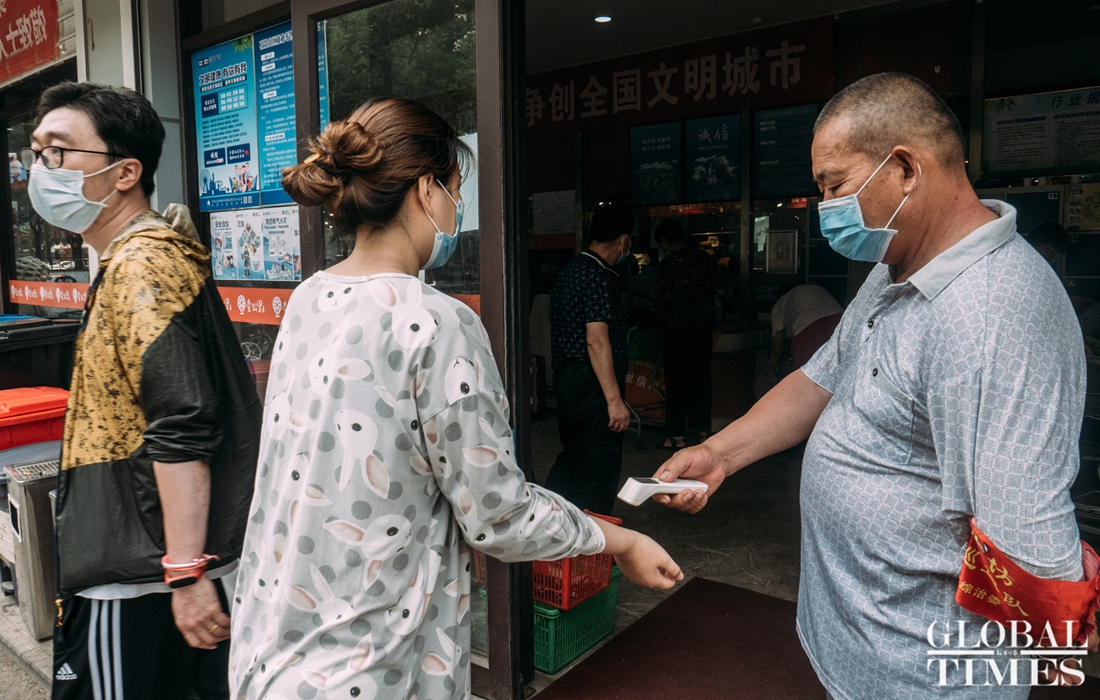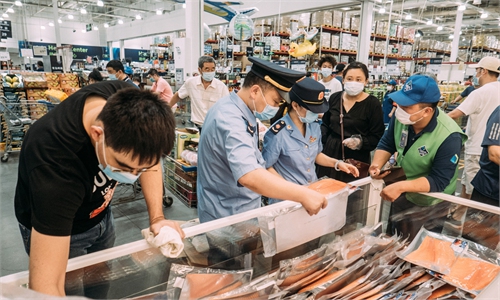
Photo: Li Hao/GT
Forty-six people in Beijing have tested positive for the coronavirus over the last few days. All of them were connected to local markets but none have symptoms and are under close medical observation, Pang Xinghuo, deputy director of the municipal center for disease prevention and control, said at a press conference on Saturday.
Of the 517 samples taken at the Xinfadi wholesale market in Beijing’s Fengtai district, 45 people’s throat swabs tested positive for the virus. Another person connected to a market in Beijing’s Haidian district also tested positive.
Forty environmental samples collected at the Xinfadi market also tested positive. Testing of some 10,000 people who have connections to the market began after six confirmed cases of COVID-19 were reported on Friday, following a single new confirmed case on Thursday. The city had been virus free for 55 days, according to data from Beijing authorities.
The seven people with COVID-19 had all been to the Xinfadi wholesale market.
Except the one case of COVID19 that was reported earlier on Friday, the other six cases that have been confirmed on Thursday and Friday in Beijing had not left Beijing over the last two weeks and had no contacts with foreigners or people from Hubei Province.
In response to the emergency, Fengtai has been put on a wartime footing and implemented closed management of 11 residential areas around Xinfadi market, with 24-hour personnel on duty.
Three schools and six kindergartens near the Xinfadi market were told to stop classes.
Beijing’s Xicheng district also raised the risk level of its Yuetan community to medium from low after a new local confirmed COVID-19 case was reported on Thursday.
Officials at the press conference said they could not rule out the possibility of additional cases in Beijing.
Beijing plans to carry out widespread nucleic acid tests of people who have had close contacts with the Xinfadi market since May 30.
Beijing officials said the new confirmed cases also mean the prevention and control of the epidemic should not be relaxed. Beijing residents should strictly follow prevention and control measures. Cross-province tour groups, sporting events have been requested to suspend activities.
The reopening of elementary schools, which was scheduled for Monday, has been postponed.
Currently, Beijing’s 98 nucleic acid testing institutions can process 90,000 tests a day, which has met the needs for testing in the capital, city health commission spokesperson Gao Xiaojun said at the press conference.
In attempt to calm public concern, Mei Xinyu, a research fellow at Ministry of Commerce's Chinese Academy of International Trade and Economic Cooperation, told the Global Times on Saturday that the new cases are not likely to cause widespread infections in the city.
The immediate decision to fully test close contacts within the Xindadi market reflect China’s national strength and emergency response efficiency, Mei noted.
Mei said the large-scale testing plan shows Beijing’s strong capacity for production of testing supplies and its ability to carry out testing.
He said the catering industry need not worry about a complete shutdown but warned them to strictly follow epidemic prevention guidelines.
“This is the first time Beijing has conducted such a large-scale test, and I believe the results will be as reassuring as the comprehensive test in Wuhan were,” said Mei.


